Case study :
Read the following paragraph and answers the questions :
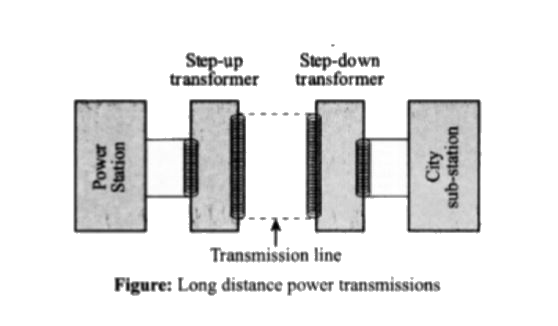
The large-scale transmission and distribution of electrical energy over long distances is done with the use of transformers. The voltage output of the generator is stepped-up. It is then transmitted over long distances to an area sub-station near the consumers. There the voltage is stepped down. It is further stepped down at distributing sub-stations and utility poles before a power supply of 240 V reaches our homes.
A power transmission line feeds input power at 2300 V to a step down transformer with its primary windings having 4000 turns. The number of turns in the secondary in order to get output power at 230 V are
4
40
400
4000
The correct Answer is:C
Step by step video & image solution for Case study : Read the following paragraph and answers the questions : The large-scale transmission and distribution of electrical energy over long distances is done with the use of transformers. The voltage output of the generator is stepped-up. It is then transmitted over long distances to an area sub-station near the consumers. There the voltage is stepped down. It is further stepped down at distributing sub-stations and utility poles before a power supply of 240 V reaches our homes. A power transmission line feeds input power at 2300 V to a step down transformer with its primary windings having 4000 turns. The number of turns in the secondary in order to get output power at 230 V are by Physics experts to help you in doubts & scoring excellent marks in Class 12 exams.
Topper's Solved these Questions
- BOOK - CBSE MODEL PAPERCHAPTER - SAMPLE PAPER 2022EXERCISE - SECTION B24videos
SAMPLE PAPER 2022
- BOOK - CBSE MODEL PAPERCHAPTER - Additional Practice QuestionsEXERCISE - Question1videos
Additional Practice Questions
- BOOK - CBSE MODEL PAPERCHAPTER - SAMPLE PAPER 2022 TERM IIEXERCISE - SECTION B16videos
SAMPLE PAPER 2022 TERM II
Similar Questions
Case study :
Read the following paragraph and answers the questions :
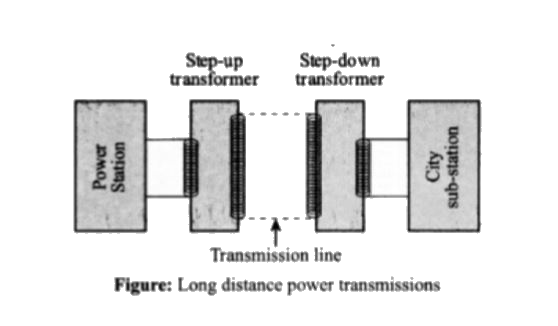
The large-scale transmission and distribution of electrical energy over long distances is done with the use of transformers. The voltage output of the generator is stepped-up. It is then transmitted over long distances to an area sub-station near the consumers. There the voltage is stepped down. It is further stepped down at distributing sub-stations and utility poles before a power supply of 240 V reaches our homes.
Which of the following statement is true?View SolutionCase study :
Read the following paragraph and answers the questions :
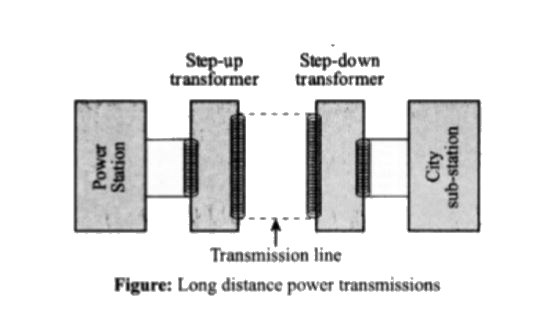
The large-scale transmission and distribution of electrical energy over long distances is done with the use of transformers. The voltage output of the generator is stepped-up. It is then transmitted over long distances to an area sub-station near the consumers. There the voltage is stepped down. It is further stepped down at distributing sub-stations and utility poles before a power supply of 240 V reaches our homes.
We need to step-up the voltage for power transmission, so thatView Solution
Knowledge Check
- Question 1 - Select One
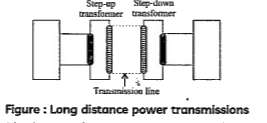
Figure : Long distance power transmissions The large-scale transmission and distribution of electrical energy over long distances is done with the use of transformers. The voltage output of the generator is stepped-up. It is then transmitted over long distances to an area sub station near the consumers. There the voltage is stepped down. It is further stepped down at distributing sub-stations and utility poles before a power supply of 240 V reaches our homes.
A power transmission line feeds input power. at 2300 V to a step down transformer with its primary windings having 4000 turns. The number of turns in the secondary in order to get output power at 230 V are :A4B40C400D4000 - Question 2 - Select One

Figure : Long distance power transmissions The large-scale transmission and distribution of electrical energy over long distances is done with the use of transformers. The voltage output of the generator is stepped-up. It is then transmitted over long distances to an area sub station near the consumers. There the voltage is stepped down. It is further stepped down at distributing sub-stations and utility poles before a power supply of 240 V reaches our homes.
Which of the following statement is true?AEnergy is created when a transformer steps up the voltageBA transformer is designed to convert an AC voltage to DC voltageCStep-up transformer increases the power for transmissionDtep-down transformer decreases the AC voltage - Question 3 - Select One
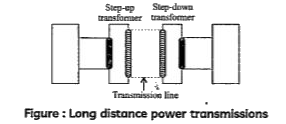
Figure : Long distance power transmissions The large-scale transmission and distribution of electrical energy over long distances is done with the use of transformers. The voltage output of the generator is stepped-up. It is then transmitted over long distances to an area sub station near the consumers. There the voltage is stepped down. It is further stepped down at distributing sub-stations and utility poles before a power supply of 240 V reaches our homes.
We need to step-up the voltage for power. transmission, so that:AThe currentis reduced and consequently, the I2R loss is cut downBThe voltage is increased, the power losses are also increasedCThe power is increased before transmission is doneDThe voltage is decreased so V2R losses.are reduced
Case study :
Read the following paragraph and answers the questions :
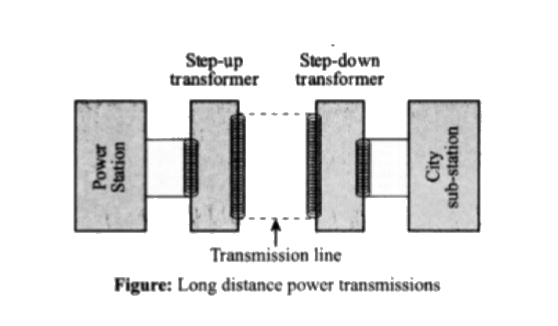
The large-scale transmission and distribution of electrical energy over long distances is done with the use of transformers. The voltage output of the generator is stepped-up. It is then transmitted over long distances to an area sub-station near the consumers. There the voltage is stepped down. It is further stepped down at distributing sub-stations and utility poles before a power supply of 240 V reaches our homes.
If the secondary coil has a greater number of turns than the primary,View SolutionState the underlying principle of a transformer. How is the large scale transmission of electric energy over long distances done with the use of transformers ?
View Solution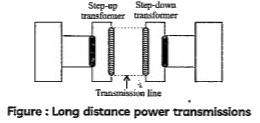
Figure : Long distance power transmissions The large-scale transmission and distribution of electrical energy over long distances is done with the use of transformers. The voltage output of the generator is stepped-up. It is then transmitted over long distances to an area sub station near the consumers. There the voltage is stepped down. It is further stepped down at distributing sub-stations and utility poles before a power supply of 240 V reaches our homes.
If the secondary coil has a greater number of turns than the primary,View SolutionIn a step - down transformer, the number of turns in
View SolutionWhat is increased in a step-down transformer?
View Solution
